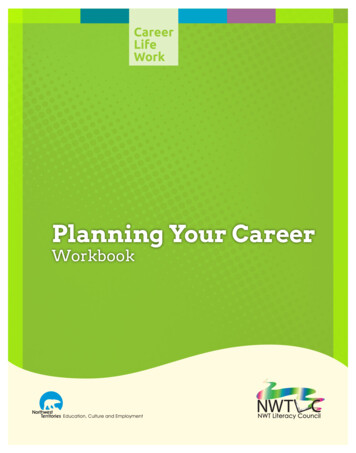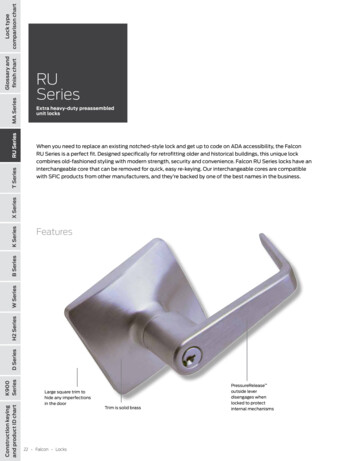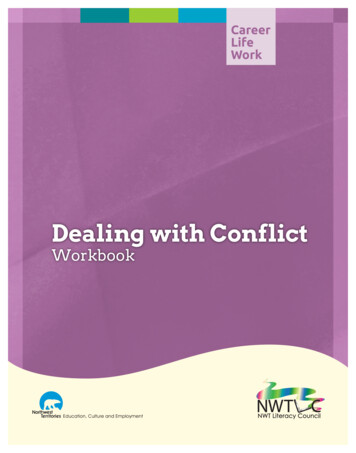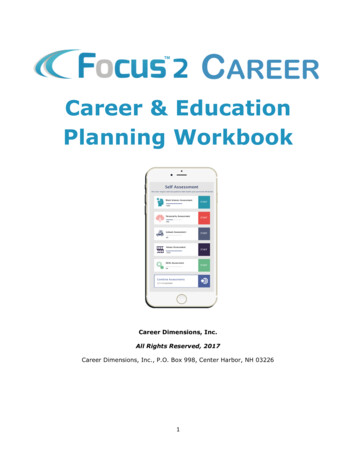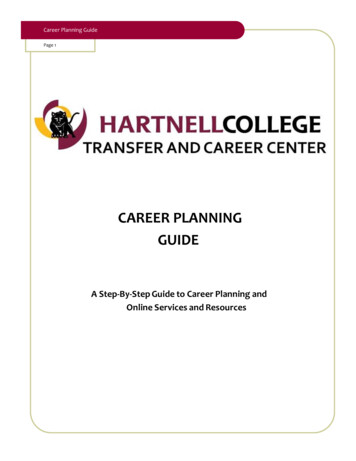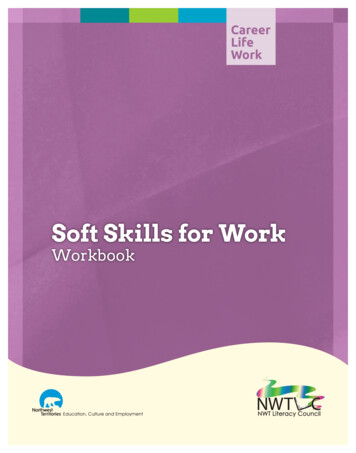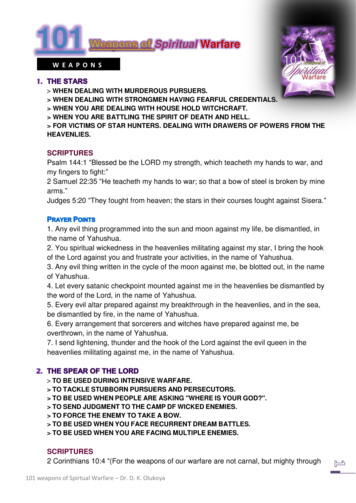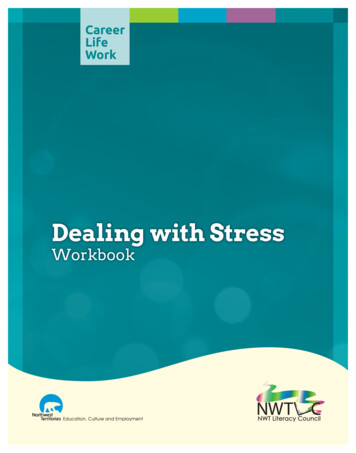
Transcription
CareerLifeWorkDealing with StressWorkbook
AcknowledgementsThe NWT Literacy Council gratefully acknowledges the financial assistance forthis project from the Department of Education, Culture and Employment,Government of the Northwest Territories.With thanks to Lisa Campbell for developing this resource for the NWT LiteracyCouncil.There are 10 manuals and workbooks in the Career – Life – Work series. Youwill find a list of them on the last page of this workbook. You can find thewhole series online at www.nwt.literacy.ca under the adult resources section.If you would like print copies, please contact the NWT Literacy Council.Box 761, Yellowknife, NT X1A 2N6Phone toll free: 1-866-599-6758Phone Yellowknife: (867) 873-9262Fax: (867) 873-2176Email: nwtliteracy@nwtliteracy.caWebsite: www.nwt.literacy.caISBN: 978-1-896472-45-4 (November 2012)
Dealing with StressCareer Life WorkTable of ContentsAbout this Workbook . 2What is Stressful for You? . 3Did You Know? . 4What Roles Do You Play? . 5What are Some of the Challenges You Face? . 6Stress Test. 7Your Stress Signals . 10Stress Journal . 13Managing Your Stress . 15Your Top Ten Stress Busters . 18Stress Case Studies . 19Work-Life Balance . 23Career - Life – Work Dealing with Stress Workbook11
Dealing with StressCareer Life WorkAbout this WorkbookThe subject of stress has become a common topic of conversation. We often hearfriends, classmates, coworkers, and family members talk about the problemsthey have in managing the stresses of everyday living. We say we feel burnedout, stressed out, overwhelmed, angry, irritable, depressed, anxious, and on theverge of losing it.Stress is your body's way of responding to any kind of demand. It can be causedby both good and bad experiences. When people feel stressed by somethinggoing on around them, their bodies react by releasing chemicals into the blood.These chemicals give people more energy and strength, which can be a goodthing if their stress is caused by a burning fire and they need to get out of abuilding quickly. But this can also be a bad thing, if their stress is in response tosomething emotional and there is no outlet for this extra energy and strength.To successfully relieve stress it's important to understand it's not the things onthe outside that do us harm; it's how we handle these situations. Emotions, orfeelings, have a powerful impact on the human body. Emotions like frustration,insecurity and depressing feelings can be very harmful to us. Positive emotionslike appreciation, care, and love not only feel good, they promote health,performance and well-being.This workbook will help you evaluate your own stress levels and give you sometools to manage your stress.2Career - Life – Work Dealing with Stress Workbook2
Dealing with StressCareer Life WorkWhat is Stressful for You?Public speaking is the number one fear for many people. In other words, itstresses them out. What do you find stressful?Your Turn! Check off the things that you find stressful below.Stressor StressorWork/jobFinancesSchool workMental healthRelationship with partnerRelationship with familyRelationship with friendsCareer directionChildcarePhysical healthTraumaLegal mattersWork or school/life balanceAttitudes and thoughtsAppearanceLiving situationPublic speakingBeing organizedHousework and/or messy houseInterview for a jobTime (lack of)Exams What else stresses you out?1.3.2.4.Career - Life – Work Dealing with Stress Workbook33
Dealing with StressCareer Life WorkDid You Know?1Too much continued stress can seriously affect our physical and mental wellbeing. It can interfere with our normal daily activities, lower our self-esteem,hurt relationships, and hurt work and academic performance. Stress can lead toself-blame, self-doubt, feeling burned out, or becoming very anxious ordepressed.Here are some important facts about stress: 43% of adults experienced adverse health effects from stress. People with high stress are twice as likely to develop colds asthose with low stress. 75-90% of visits to a physician's office are for stress-related conditions andcomplaints. Stress has been linked to the six leading causes of death: heart disease,cancer, lung ailments, accidents, cirrhosis of the liver, and suicide. The United States National Institute of Occupational Safety and Health hasdeclared stress a hazard of the workplace. In the workplace, stress may be related to lost hours due to illness, reducedproductivity, and claims for worker's compensation benefits.Your Turn! How does stress affect you?1Source: The Stress Solution by Lyle H. Miller, Ph.D., and Alma Dell Smith, PhD.4Career - Life – Work Dealing with Stress Workbook4
Dealing with StressCareer Life WorkWhat Roles Do You Play?What are all the different roles that you play in your life?For example:Mother: I take care of my children 24/7, feed, clothe, love, nurture,educate, discipline, drive, take them to school, or daycare, etc.Student: I am expected to arrive at school on time, do my assignments, bea role-model for my children and other family members, etc.Son: I am expected to hunt, fish and provide for my parents and otherfamily members as they get older.Your Turn!Write down the roles that you play and all the responsibilities you have with thatrole.Career - Life – Work Dealing with Stress Workbook55
Dealing with StressCareer Life WorkWhat are Some of the Challenges You Face?What are some of your challenges to be successful in school or at a job?For example: No vehicle Single parent Illness Limited budget Disability Expensive daycareYour Turn! What are some of your challenges?Your Turn!These kinds of challenges can be very stressful. Talk to a friend or classmate anddiscuss how you can overcome some of these challenges. Write down your ideashere:6Career - Life – Work Dealing with Stress Workbook6
Dealing with StressCareer Life WorkStress TestCertain things in our life can make us more prone to stress like certain habits, ourlifestyle and choices we make. How prone are YOU to stress?Your Turn! Read each statement and rate how it applies to you.Give yourself 4 points for Almost Always 3 points for Usually 2 points for Sometimes 1 point for Almost Never 0 points for NeverAlmostAlwaysUsuallySome- Almost Nevertimes Never1. I eat at least one hot, balanced meala day.2. I get 7-8 hours of sleep, at least 4nights a week.3. I give and receive affectionregularly.4. I have at least one relative within50 kms on whom I can rely.5. I exercise to the point ofperspiration at least twice a week.6. I smoke less than half a pack ofcigarettes a day (non-smokers almost always).Career - Life – Work Dealing with Stress Workbook77
Dealing with StressCareer Life Work7. I drink fewer than five alcoholicdrinks a week (non-drinkers almost always).8. I am the appropriate weight for myheight.9. My income is adequate for mybasic needs.10. I get strength from myreligious/spiritual beliefs.11. I regularly attend club or socialactivities.12. I have a network of friends andacquaintances.13. I have at least one friend in whom Iconfide about personal matters.14. I am in good health (includingeyesight, hearing, teeth, etc.).15. I am able to speak openly about myfeelings when angry or worried.16. I have regular conversations withmy housemates/partner aboutdomestic problems.17. I do something fun at least once aweek.8Career - Life – Work Dealing with Stress Workbook8
Dealing with StressCareer Life Work18. I am able to organize my timeeffectively.19. I drink fewer than three caffeinedrinks a day.20. I take quiet time for myself duringthe day (at least 10 min.).TotalWhat your score means:60-80Shows that you have excellent ways of dealingwith the stressors of everyday life50-60Shows that you have a healthy way of dealingwith the stressors of everyday life40-50Shows that you are struggling to deal with thestressors of everyday life20-40Shows that you are having a really hard timedealing with the stressors of everyday life0-20Shows that you are at high risk of having a breakdown due to the stressors of everyday lifeCareer - Life – Work Dealing with Stress Workbook99
Dealing with StressCareer Life WorkYour Stress SignalsHere is a list of some, but not all, possible reactions to stress. Check all of thesymptoms you experience when you feel stressed. Notice that symptoms ofstress can affect us in all sorts of ways. It can affect us physically, behaviorally,emotionally, and cognitively.You can learn to recognize these symptoms or signals in yourself before stressgets too far out of hand. When you recognize your unique signals, it’s time totake action. Ideas for this are coming up!Your Turn!Check the symptoms that you have when you get stressed out.Physical Symptoms 10 HeadachesBack painIndigestionTight neck, shouldersStomach achesRacing heartSweaty palmsShallow breathingCold hands, feetRestlessDizzyRinging in the earsEasily fatiguedConstipationMuscle tensionDiarrheaCareer - Life – Work Dealing with Stress Workbook10
Dealing with StressCareer Life WorkBehavioral Symptoms Excessive smokingDrive too fastBossy with othersGrind teethEat too little or too muchOveruse of alcoholCritical attitude of othersInability to finish tasksShort-temperedBite your nailsProcrastinateFidgetySleep too much or too littleVery tenseEmotional Symptoms Bothered by unimportantthingsCry easilyNervous, anxiousFeel overwhelmedEdgyAngryLonelyIrritableDepressedFeel burned outMoodyFeel powerlessFeel helplessYell a lotCareer - Life – Work Dealing with Stress Workbook1111
Dealing with StressCareer Life WorkCognitive Symptoms 12 Trouble thinking clearlyInability to makedecisionsDifficulty concentrating onthingsWorry constantlyForgetfulnessLoss of humourLack of creativitySelf-criticalExpect too much from othersPessimisticCareer - Life – Work Dealing with Stress Workbook12
Dealing with StressCareer Life WorkStress JournalA stress journal can help you identify regular stressors in your life and the wayyou deal with them. Each time you feel stress, keep track of it in your journal. Asyou keep a daily log, you will begin to see patterns and common themes.Think of something that is stressing you out now. Here is an example.What is the issue?Money is tight. By the end of the month I don’t have enough money for groceriesand I can’t send my kids to school with lunch. Often I keep them out and we goto the Women’s Centre for lunch. That means I can’t go to school either.How do you feel both physically and emotionally?It makes me feel sick to my stomach that I can’t feed my children properly. I getvery anxious and depressed. I also get worried that I will be kicked out of school.How do you act in response to this stress?I often get angry that I can’t support my family better. I sometimes yell at mykids or partner.What can you do to make yourself feel better?I need to talk to someone about this situation and see if I can get help fromsomewhere. I don’t have time to get a job as I am in school full-time and I can’tafford a babysitter for kids in the evenings and weekend. I just need a little extrahelp. I don’t want to yell at my kids anymore so I need to take deep breathswhen I feel that anxiety creeping into my chest.Career - Life – Work Dealing with Stress Workbook1313
Dealing with StressCareer Life WorkYour Turn!What is the issue?How do you feel both physically and emotionally?How do you act in response to this stress?What can you do to make yourself feel better?Did you know?Daily journal writing is known to help with stress. It is a great technique forreleasing stress and coming up with ideas to tackle problems you are facing inyour life.14Career - Life – Work Dealing with Stress Workbook14
Dealing with StressCareer Life WorkManaging Your StressYour Turn!So far we have been focusing on the source and symptoms of stress, but now let’slook at solutions. Try and work with a group of people for this section.Brainstorming is more effective if you have several people working together.What are some stressors that you face?What are some unhealthy ways of dealing with stress?Career - Life – Work Dealing with Stress Workbook1515
Dealing with StressCareer Life WorkWhat are some healthy ways of dealing with stress?Compare your lists with the lists below:Unhealthy Ways of Managing Stress Drinking Drugs Yelling Gossiping Arguing Hitting Fighting16 SmokingWatching TVEating excessivelySpending moneyBuying thingsGamblingBecoming a lonerCareer - Life – Work Dealing with Stress Workbook16
Dealing with StressCareer Life WorkHealthy Ways of Managing Stress1. Choose New BehaviorsResolve incomplete tasks. Take Breathe deeply.care of them now! Go for a walk. Keep your finances organized. Go out on the land. Say "no". Go fishing. Relax. Exercise. Meditate or pray for 10 minutes a Listen to uplifting music.day. Laugh. Watch a funny movie. Call a friend. Take a long bath. Work on a hobby (sewing, Write in your journal. Read a good book. crafting, etc.). Eat healthy food.2. Choose New ThoughtsVisualize problems and troubles Detach.shrinking to a manageable size. Reframe. Take a mental vacation. Visualize success. Challenge negative beliefs about Assume the best.yourself. Face the fear. Focus on the positive. Identify your hurt. Find the opportunity in the Forgive. problem. Evaluate – Will this matter oneyear from now? Trust a positive outcome.Career - Life – Work Dealing with Stress Workbook1717
Dealing with StressCareer Life WorkYour Top Ten Stress BustersYour Turn!Look at both your list and the list given for dealing with stress in a healthy way.Choose your top ten stress busters. Write them below. Now write them on a cuecard and put it where you can see it each day (e.g. in your wallet, on yourfridge or your bathroom mirror).1.2.3.4.5.6.7.8.9.10.18Career - Life – Work Dealing with Stress Workbook18
Dealing with StressCareer Life WorkStress Case StudiesYour Turn!Read the case studies below and write down all the things that could be stressfulfor this person. Write down how they seem to be coping with the stress and giveideas for coping with the stress. Work with a partner on this activity.Lorne is a single father of three children all under the age of 10.He works full time as a water delivery driver. He and his ex-wifedo not get along and she rarely sees the kids. He lives in his homecommunity and has friends and family to help him out. He rarelyhas time for himself or the activities he likes. Some of his ways ofcoping are drinking once the kids have gone to bed and gamblingonline.StressorsWays Lorne isCoping (good or bad)Other SuggestionsCareer - Life – Work Dealing with Stress Workbook1919
Dealing with StressCareer Life WorkShawna works full time and is in charge of running herhousehold. Her husband rarely helps out at home with thehousework and kids. He spends a lot of time gambling anddrinking with friends. Shawna is tired most of the time andrarely has a minute for herself. Her daycare provider is oftensick and so she has to find alternative care for her children. Sheoften takes her frustrations out on her kids and then she feelsreally bad afterwards. She feels like she can’t take it anymore.Stressors20Ways Shauna isCoping (good or bad)Other SuggestionsCareer - Life – Work Dealing with Stress Workbook20
Dealing with StressCareer Life WorkTessa cares for her mother at home and her children. Herhusband works full-time and helps her out quite a bit. Hermother has dementia and is quite difficult to deal with at times.She forgets things and often leaves the house in the middle ofwinter without any warm clothing on. Tessa wants to care forher mother but is finding it increasingly hard. She feels that shehas no options in her community. Tessa tries to manage thestress by taking long walks in the evenings and talking to herfriends about the issue.StressorsWays Tessa isCoping (good or bad)Other SuggestionsCareer - Life – Work Dealing with Stress Workbook2121
Dealing with StressCareer Life WorkBarry is in school full-time in Fort Smith. He left his familybehind so that he could pursue his life-long dream of becoming acarpenter. Money is tight at home and he doesn’t have a way ofsupporting his family until he finishes school. School is hard; it ismuch harder than he thought it would be. He is struggling tokeep up and feels that he is not smart enough to continue. If hedoesn’t complete the course he has to pay back all the money hegot from the government to go to school. He feels very stressedout. On occasion he has gone binge drinking to relieve the stressbut realized that this wasn’t helping him. He decided to talk tothe pastor at the church and now when he gets stressed out hecalls up the pastor and they go for coffee and talk about waysthat Barry can handle his stress.Stressors22Ways Barry isCoping (good or bad)Ideas for CopingCareer - Life – Work Dealing with Stress Workbook22
Dealing with StressCareer Life WorkWork-Life BalanceYour TurnTake this short quiz to see if you have Work-Life Balance in your life.Agree Disagree1. I regularly enjoy hobbies or interests.2. I make time for everything that I need to do.3. I work or go to school between 30 – 45 hours a week.4. I get worked up about school assignments or workissues.5. I usually have enough time to spend with my lovedones.6. When I am home I feel relaxed.7. I rarely lose my temper at home, at school or work.Career - Life – Work Dealing with Stress Workbook2323
Dealing with StressCareer Life Work8. I often feel exhausted by Wednesday and wonder howI can make it to the weekend.9. I rarely miss out on family events because of school orwork.10. School or my work gets frustrating. I am often late ordistracted.11. My family is often upset with me because I spend toomuch time studying or working.12. School or work is often on my mind when I am doingother things.Rate yourself the following way:Give yourself 2 points if you Agreed to: 1, 2, 3, 5, 6, 7, 9,Give yourself 2 points if you Disagreed to: 4, 8, 10, 11, 12Excellent Work-Life Balance – 20-24 pointsGood Work-Life Balance – 14- 20 pointsPoor Work-Life Balance – Below 1424Career - Life – Work Dealing with Stress Workbook24
Dealing with StressCareer Life WorkYour TurnWrite down some things that you can do to make your work and life morebalanced?Career - Life – Work Dealing with Stress Workbook2525
Career Life WorkThe Career-Life-Work Series consists of the following: Personal Management Skills ManualCommunication Skills ManualCareer Development ManualJob Success Strategies ManualDealing with Conflict WorkbookGetting the Job WorkbookSoft Skills for Work WorkbookPlanning Your Career WorkbookDealing with Stress WorkbookGoal Setting WorkbookYou can download these documents from www.nwt.literacy.caBox 761, Yellowknife, NT X1A 2N6Phone toll free: 1-866-599-6758Phone Yellowknife: (867) 873-9262Fax: (867) 873-2176Email: nwtliteracy@nwtliteracy.caWebsite: www.nwt.literacy.ca26Dealing with Stress Workbook
Career Life WorkDealing with Stress Workbook27
Career Life Work28Dealing with Stress Workbook
Career Life Work
This workbook will help you evaluate your own stress levels and give you some tools to manage your stress. Career Life rk Dealin it tress Workbook 3 . It can interfere with our normal daily activities, lower our self-esteem, hurt relationships, and hurt work and academic performance. Stress can lead to self-blame, self-doubt, feeling burned .
